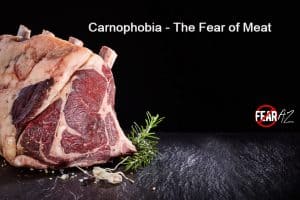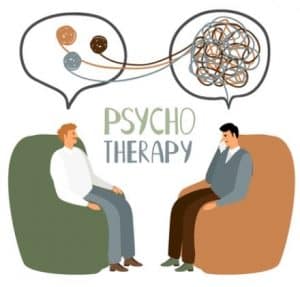Share This Article
No Bones About It, Carnophobia Is Real
Do you feel nauseous every time you smell meat? Does the sight of someone eating a steak or pork chop make you feel sick?
Do you break into a cold sweat whenever you pass the meat aisle in the grocery? Do you avoid looking at television commercials featuring burgers and similar products? Did you decide to become a vegetarian or vegan because of an intense disgust of meat products?
What may be delicious for one person can seem dreadful for another. But what if your distaste for meat goes beyond simple preference? What if you simply cannot stand the sight or thought of meat?
A Phobia of Fear or Disgust?
Have you ever found yourself typing this on Google: “What is the fear of eating meat called?” If you think you have this phobia, don’t worry. The most effective way to deal with it is to know why it exists in the first place.
This seemingly irrational fear of meat is real. It’s not just your imagination.

What Is Carnophobia?
The term carnophobia is a combination of karno, which means “meat,” and phobia, which refers to fear. This extreme fear of meat could be caused by the smell, sight, or taste of meat. Even thinking about meat or cooking it can cause a severe reaction. Meat eaters who start to suddenly show signs of carnophobia may have more severe responses compared to those who are vegetarians from the get-go.
Carnophobic people avoid going to places that cook or serve meat. If they think they have consumed meat unknowingly, their brain gets obsessed with thoughts that are serious enough to make the body physically ill. This phobia may cause you to throw up at the smell or sight of meat products.
Carnophobia Causes
Genetic or Biological
You may have genes that make you prone to developing phobias or anxiety disorders. Sometimes, the disorder remains dormant then suddenly wakes up after an event or trigger.
Sensory
Another cause for carnophobia could be a reaction to the taste or texture of meat. As a child, you may have hated the feeling of meat on your tongue so much that you developed this phobia. A phobia of raw meat or cooked meat isn’t unheard of.
Trauma
A common cause of carnophobia is visiting a butcher shop. The first time you visit a butcher shop, you may have been shocked to see raw and bloody cuts of meat hanging from hooks or displayed on trays. Some people are disturbed by this, as it may remind them of death or violence.
Past experiences like a severe infection or an animal attack can also cause this phobia. Some people fear the ill effects of eating meat. Others have developed carnophobia after reading about mad cow disease or other diseases caused by eating animal flesh.
Behavioral
Are you a vegetarian or a vegan? Have you recently switched from meat to plant-based food? While it is unlikely, this lifestyle change could evolve into a hatred of meat. Some religions don’t allow followers to eat meat or use certain animal products. What starts as a fear of punishment for a sinful or forbidden act may evolve into a fear of meat itself.
Environmental
Parents, relatives, or caregivers who have carnophobia can pass it on to children or other family members. They may instill a distaste for meat, or their reaction to meat may create a negative impression. Carnophobia may also be linked with growing up with pets or in a rural town with lots of farm animals. Seeing the death of an animal could become a trigger that surfaces every time you look at a piece of meat.
Symptoms of Carnophobia
Carnophobia symptoms include both physical and mental/emotional signs, most of which are easy to connect with triggers or causes. Knowing the right combination of symptoms can make it easier for the therapist to tell if you have carnophobia or not.
Physical Symptoms
- Tightness in the chest or choking
- Trouble breathing
- Nausea or vomiting
- Loss of appetite
- Hyperventilation
- Dry mouth
- Increased heart rate
- Trembling or shaking
- Sweating
- Stomachache
- Lightheadedness
- Confusion
- Dizziness
Mental/Emotional Symptoms
- Mood swings
- Dread
- Panic attacks
- Inability to concentrate
- Short temper
- Fear of becoming sick from eating meat
- Fear of animals
- Obsessive thoughts about meat being butchered
- Guilt or shame
How Do You Deal with Carnophobia?
Meat seems to be everywhere. Even if you stop eating it, you may still see and smell your colleague’s lunch or your neighbor’s barbecue. Not to mention the television has endless advertising for restaurants and meal delivery services that feature meat products.
Also, meat is a source of some of our nutritional requirements, especially protein. Going completely meat-free might not be healthy for you. In some areas, meat is cheaper than fresh produce, so you may end up spending more on a plant-based diet.
If you wish to overcome this phobia, you’re in luck. With carnophobia treatment like mental health therapy, self-help exercises, and medication, managing your symptoms is possible. You may even cure the disorder completely.
Self Help – What Can You Do to Help Yourself?
Mindfulness
Mindfulness is an effective coping mechanism for dealing with stressors, including phobias. All self-help starts with controlling your thoughts. Try sitting in a relaxed position and focusing on your body, thoughts, and feelings. If you feel yourself drifting off into the past or future events, then calmly bring your mind back to the present. Thinking of where you are, how you are, and what is happening around you will slowly become a habit.
Diet
Carnophobia is a food-related disorder, so try to observe how your diet affects your phobia. Get tests done to ensure you are not allergic or intolerant to certain food items. You should also stay away from caffeine, alcohol, and processed food, as these foods cause anxiety levels to skyrocket.
Exercise
Regular exercise and movement can help take the stress out of your body. Physical activity is known to lessen anxiety, so it may help you deal with this phobia.
Sleep
Make sure you get enough sleep. A lot of phobia symptoms get worse when you are sleep-deprived and exhausted.
Self-Help Groups
Join a self-help group that discusses carnophobia and ways to manage symptoms. Seeing that you’re not alone can make it easier to deal with this phobia.

Getting Professional Help
Dialectical Behavioral Therapy (DBT)
DBT uses mindfulness-based practices under the guidance of a trained professional. It is a type of cognitive behavioral therapy that helps you stay present and calm in a stressful situation.
Neuro-Linguistic Programming (NLP)
NLP is a method that uses therapy to reframe unhelpful thoughts so your perception about meat becomes more rational. If successfully done, you might still hate meat, but you will no longer be afraid of it.
Exposure Therapy
Some professionals recommend this method as a way to manage phobias and desensitize yourself. It starts with visualizing the trigger, in this case eating, cooking, or looking at meat. Gradually, you’ll try to expose yourself to actual situations where meat is used.
Medication
Medication for anxiety may be prescribed, but only as a last option. These substances are designed to reduce your response to stressors related to carnophobia.
Learning to Cope with Carnophobia
Coping with carnophobia can be easier for a vegetarian, but what if you loved meat before you started to fear it? With this essential information and the guidance of a medical professional, it’s possible for you to enjoy burgers and steaks.



